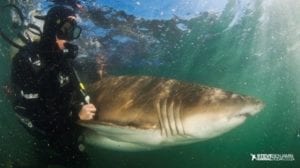Transporting sharks is not something Imperial Truck Rental is called upon to do on a daily basis but the company was proud to have been involved in assisting with the release of two ragged-tooth sharks into the ocean off Gordon’s Bay.
The Imperial Logistics group company rented an 8-ton crane truck to the Aquarium, for the release of Kay, along with a male shark that had been displayed in the marine exhibit at the National Zoological Gardens in Pretoria since 2011. Johnny Wright, Imperial Truck Rental MD says, “We were delighted to have had the opportunity to play a part in the Two Oceans Aquarium’s shark conservation programme – and, of course, to help get Kay and her companion home safely.” Tinus Beukes, the Aquarium; operations manager adds, “Both sharks were pit tagged with VERBAC tags before going on display and were also be tagged with acoustic VEMCO tags (active for 10 years) before their release, so that their movements can be monitored should they pass one of the many receiver base stations positioned along the South African coast.” The sharks’ release forms part of an ongoing release programme which was initiated by the Two Oceans Aquarium in 2004, with the release of “raggie” Maxine. Her release set in motion the Save Our Seas Foundation Maxine, Science, Education and Awareness (M-Sea) Programme, an AfriOceans Conservation Alliance (AOCA) initiative, sponsored by the Save Our Seas Foundation. Eight sharks have subsequently been released from the Two Oceans Aquarium – since 2004.When Kay was collected at Hamburg, East London, she measured 149cm in length (notch length) and weighed 51.4kg. When she left the I&J Predator Exhibit at the Two Oceans Aquarium to return to the ocean, she weighed 207.2kg and was 277 cm in length. Ragged-tooth sharks attain a maximum total length of about 3,2m and a maximum age of about 30 years. They go through about 30 000 teeth in a lifetime.
Known as ‘grey nurse’ sharks in Australia and ‘sand tigers’ in America, raggies occur in the Atlantic, Indian and Western Pacific Oceans. Their numbers have been seriously depleted in Australia due to over-fishing. Concludes Beukes, “As far as we know, South Africa has one of the healthiest populations of ragged-tooth sharks in the world and these sharks are quite common along the entire sub-tropical east and south Cape coasts.However, while these sharks occur in positive numbers, they require protection and effective conservation management.”








